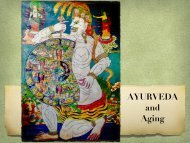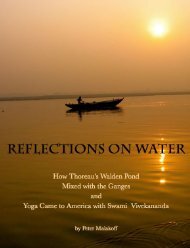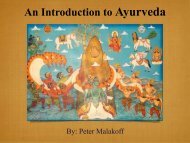How Thoreau's Walden Pond Mixed with the Ganges and Yoga Came to America with Swami Vivekananda
One early morning in 1846, during the coldest days of a New England winter, Henry David Thoreau looked out the window of his small cabin on Walden Pond and saw men cutting its ice into blocks. That ice was hauled by horse to a railroad that ran across the western edge of Walden Pond, packed into a boxcar, taken to Boston and loaded onto a clipper ship that sailed to Calcutta, India, arriving about four months later. Once there, that ice was purchased by grateful members of the East India Company. Thoreau had witnessed a small part of the global ice trade between New England and India that took place during the latter part of the nineteenth century. When Thoreau considered the ice trade, his vision sailed on metaphors far beyond the scope of business. The waters he imagined flowed both east and west and carried not just natural elements, but culture, religion and philosophy as well. He envisioned that after arriving in Calcutta, the New England ice of Walden Pond would eventually melt and run downhill where it would join with the sacred water of the Ganges. He wrote in Walden: "It appears that the sweltering inhabitants of Charleston and New Orleans, of Madras and Bombay and , drink at my well. In the morning I bathe my intellect in the stupendous and cosmogonal philosophy of the , since whose composition years of the gods have elapsed, and in comparison with which our modern world and its literature seem puny and trivial; and I doubt if that philosophy is not to be referred to a previous state of existence, so remote is its sublimity from our conceptions. I lay down the book [Bhagavad-Gita] and go to my well for water, and lo! there I meet the servant of the Bramin, priest of and and who still sits in his temple on the Ganges reading the , or dwells at the root of a tree with his crust and water jug. I meet his servant come to draw water for his master, and our buckets as it were grate together in the same well. The pure Walden water is mingled with the sacred water of the Ganges." This book tells the story of these waters . . .
One early morning in 1846, during the coldest days of a New England winter, Henry David Thoreau looked out the window of his small cabin on Walden Pond and saw men cutting its ice into blocks. That ice was hauled by horse to a railroad that ran across the western edge of Walden Pond, packed into a boxcar, taken to Boston and loaded onto a clipper ship that sailed to Calcutta, India, arriving about four months later. Once there, that ice was purchased by grateful members of the East India Company. Thoreau had witnessed a small part of the global ice trade between New England and India that took place during the latter part of the nineteenth century.
When Thoreau considered the ice trade, his vision sailed on metaphors far beyond the scope of business. The waters he imagined flowed both east and west and carried not just natural elements, but culture, religion and philosophy as well. He envisioned that after arriving in Calcutta, the New England ice of Walden Pond would eventually melt and run downhill where it would join with the sacred water of the Ganges. He wrote in Walden: "It appears that the sweltering inhabitants of Charleston and New Orleans, of Madras and Bombay and , drink at my well. In the morning I bathe my intellect in the stupendous and cosmogonal philosophy of the , since whose composition years of the gods have elapsed, and in comparison with which our modern world and its literature seem puny and trivial; and I doubt if that philosophy is not to be referred to a previous state of existence, so remote is its sublimity from our conceptions.
I lay down the book [Bhagavad-Gita] and go to my well for water, and lo! there I meet the servant of the Bramin, priest of and and who still sits in his temple on the Ganges reading the , or dwells at the root of a tree with his crust and water jug. I meet his servant come to draw water for his master, and our buckets as it were grate together in the same well. The pure Walden water is mingled with the sacred water of the Ganges."
This book tells the story of these waters . . .
You also want an ePaper? Increase the reach of your titles
YUMPU automatically turns print PDFs into web optimized ePapers that Google loves.
Henry David Thoreau<br />
Henry David Thoreau (1817-1862) was<br />
an <strong>America</strong>n author, poet, philosopher,<br />
abolitionist, naturalist, tax resister, development<br />
critic, surveyor, his<strong>to</strong>rian, <strong>and</strong><br />
leading transcendentalist. He is best<br />
known for his book <strong>Walden</strong>, a reflection<br />
upon simple living in natural surroundings,<br />
<strong>and</strong> his essay Resistance <strong>to</strong> Civil<br />
Government (also known as Civil Disobedience),<br />
an argument for disobedience <strong>to</strong><br />
an unjust state.<br />
<strong>Thoreau's</strong> books, articles, essays, journals,<br />
<strong>and</strong> poetry <strong>to</strong>tal over 20 volumes.<br />
Among his lasting contributions were his<br />
writings on natural his<strong>to</strong>ry <strong>and</strong> philosophy,<br />
where he anticipated <strong>the</strong> methods<br />
<strong>and</strong> findings of ecology <strong>and</strong> environmental<br />
his<strong>to</strong>ry, two sources of modern day environmentalism. His literary style<br />
interweaves close natural observation, personal experience, pointed rhe<strong>to</strong>ric,<br />
symbolic meanings, <strong>and</strong> his<strong>to</strong>rical lore, while displaying a poetic sensibility, philosophical<br />
austerity, <strong>and</strong> "Yankee" love of practical detail. He was also deeply interested<br />
in <strong>the</strong> idea of survival in <strong>the</strong> face of hostile elements, his<strong>to</strong>rical change,<br />
<strong>and</strong> natural decay; at <strong>the</strong> same time he advocated ab<strong>and</strong>oning waste <strong>and</strong> illusion<br />
in order <strong>to</strong> discover life's true essential needs.<br />
He was a lifelong abolitionist, delivering lectures that attacked <strong>the</strong> Fugitive<br />
Slave Law while praising <strong>the</strong> writings of Wendell Phillips <strong>and</strong> defending abolitionist<br />
John Brown. <strong>Thoreau's</strong> philosophy of civil disobedience later influenced<br />
<strong>the</strong> political thoughts <strong>and</strong> actions of such notable figures as Leo Tols<strong>to</strong>y, Moh<strong>and</strong>as<br />
G<strong>and</strong>hi, <strong>and</strong> Martin Lu<strong>the</strong>r King, Jr.<br />
Thoreau was heavily influenced by Indian spiritual thought. In <strong>Walden</strong>, <strong>the</strong>re<br />
are many overt references <strong>to</strong> <strong>the</strong> sacred texts of India. For example, in <strong>the</strong> first<br />
chapter "Economy," he writes:<br />
“<strong>How</strong> much more admirable <strong>the</strong> Bhagvat-Geeta than all <strong>the</strong> ruins of <strong>the</strong><br />
East!”<br />
Thoreau followed various Hindu cus<strong>to</strong>ms, including following a diet of rice<br />
(“It was fit that I should live on rice, mainly, who loved so well <strong>the</strong> philosophy of<br />
India.”), flute playing (reminiscent of <strong>the</strong> favorite musical pastime of Krishna),<br />
<strong>and</strong> yoga.<br />
In an 1849 letter <strong>to</strong> his friend H.G.O. Blake, he wrote about yoga <strong>and</strong> its<br />
meaning <strong>to</strong> him:<br />
“Free in this world as <strong>the</strong> birds in <strong>the</strong> air, disengaged from every kind of<br />
chains, those who practice yoga ga<strong>the</strong>r in Brahma (God) <strong>the</strong> certain fruits of<br />
<strong>the</strong>ir works. Depend upon it that, rude <strong>and</strong> careless as I am, I would fain practice<br />
<strong>the</strong> yoga faithfully. The yogi, absorbed in contemplation, contributes in his<br />
degree <strong>to</strong> creation; he brea<strong>the</strong>s a divine perfume, he hears wonderful things. Divine<br />
forms traverse him <strong>with</strong>out tearing him, <strong>and</strong> united <strong>to</strong> <strong>the</strong> nature which is<br />
proper <strong>to</strong> him, he goes, he acts as animating original matter. To some extent,<br />
<strong>and</strong> at rare intervals, even I am a yogi.”<br />
– Wikipedia, The Free Encyclopedia<br />
Related Glossary Terms<br />
Arjuna, Ralph Waldo Emerson, Ram Mohun Roy, <strong>Walden</strong>, <strong>Walden</strong> <strong>Pond</strong><br />
Index<br />
Find Term<br />
Chapter 1 - <strong>How</strong> <strong>Thoreau's</strong> <strong>Walden</strong> <strong>Pond</strong> <strong>Mixed</strong> <strong>with</strong> <strong>the</strong> <strong>Ganges</strong> <strong>and</strong> <strong>Yoga</strong> <strong>Came</strong> <strong>to</strong> <strong>America</strong> <strong>with</strong> <strong>Swami</strong> Vivekan<strong>and</strong>a<br />
Chapter 1 - <strong>How</strong> <strong>Thoreau's</strong> <strong>Walden</strong> <strong>Pond</strong> <strong>Mixed</strong> <strong>with</strong> <strong>the</strong> <strong>Ganges</strong> <strong>and</strong> <strong>Yoga</strong> <strong>Came</strong> <strong>to</strong> <strong>America</strong> <strong>with</strong> <strong>Swami</strong> Vivekan<strong>and</strong>a<br />
Chapter 1 - <strong>How</strong> <strong>Thoreau's</strong> <strong>Walden</strong> <strong>Pond</strong> <strong>Mixed</strong> <strong>with</strong> <strong>the</strong> <strong>Ganges</strong> <strong>and</strong> <strong>Yoga</strong> <strong>Came</strong> <strong>to</strong> <strong>America</strong> <strong>with</strong> <strong>Swami</strong> Vivekan<strong>and</strong>a


















